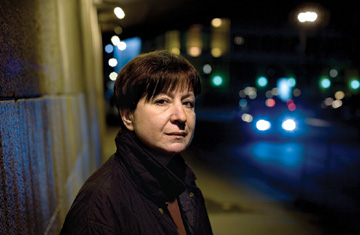
As Olga Tsepilova left a political opposition rally in St. Petersburg, Russia, last April, a member of the special forces police squad descended upon her. With a full overhead swing, he cracked Tsepilova in the face with his nightstick, fracturing her nose and cheekbone, sending her to the hospital for a month.
Tsepilova, 49, a sociologist and senior research fellow at the Russian Academy of Sciences, has run afoul of state authority before. In 2004, she hoped to study the social consequences of pollution in Russia by focusing on two closed nuclear zones. One of them, the town of Ozyorsk in the southern Urals, is the site of the infamous Mayak nuclear facility. Now a nuclear-fuel reprocessing plant, Mayak suffered the Soviet Union's largest pre-Chernobyl nuclear accident, an explosion in 1957 that spread radiation over an area of 14,300 sq. mi. (23,000 sq km). Scientists say the area has never been adequately decontaminated.
The local administration in Ozyorsk approved her research visit, but Tsepilova says the Federal Security Service (FSB) then summoned her to its St. Petersburg office, rescinded the permission and accused her of engaging in espionage. Soon after, says Tsepilova, FSB agents staked out her apartment building. The Komsomolskaya Pravda newspaper, noting that the U.S.'s National Endowment for Democracy provided some of Tsepilova's funding, labeled her research project a "spying scandal."
"Ozyorsk is the most polluted city in the world," Tsepilova says. "These problems are not being solved. This has only spurred me on."
Far from improving the situation at Mayak and other troubled sites, the Federal Atomic Energy Agency has been importing waste from foreign countries, turning nuclear sites in the Urals and elsewhere into what Greenpeace says are some of the world's largest nuclear dumps. To help lift the veil of nuclear secrecy that has persisted since the Soviet Union's disintegration, Tsepilova has joined the liberal opposition Yabloko party as head of its green wing, and is running in December's election for the Duma, Russia's lower house of parliament. "I'm persona non grata for all nuclear sites," she says. "But if I'm in the Duma, I can address environmental issues."
Tsepilova says she doesn't think the police targeted her specifically in the April march, but the incident only galvanized her to further action. Upon leaving the hospital, she gave an environmental speech at an opposition rally. The attack "hasn't weakened my political activity," she says defiantly. "I am a very brave person."